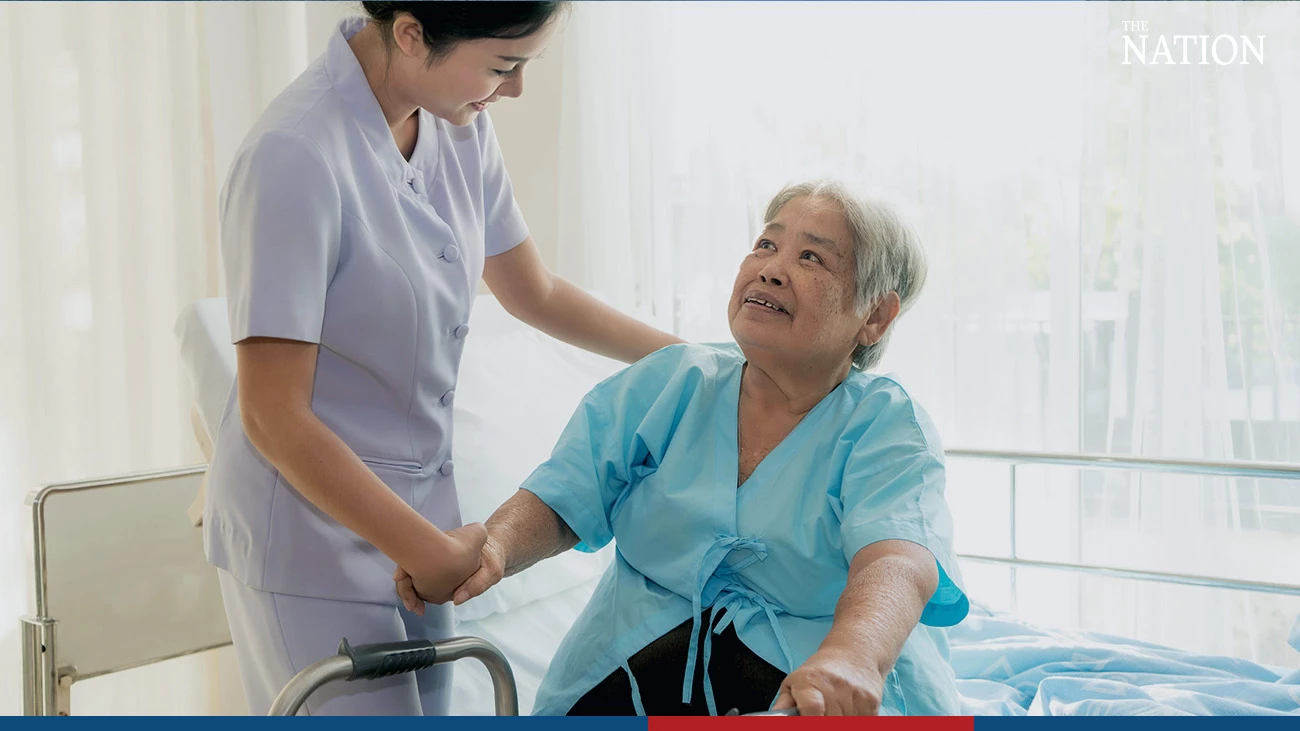
Siriraj Hospital will soon open its Academic Centre of Geriatric Medicine early next year, aimed at improving the quality of Thai elders' health and wellness.
The move is aligned with Thailand's transition into an aged society, with more than 20% of the population aged 60 and above.
Speaking at a press conference on Thursday to announce the partnership with Minor Food to help raise funds for the centre, Visit Vamvanij, Siriraj's deputy dean for Medical Services Mission, Faculty of Medicine, said that Thailand was projected to become a super-aged society within the next decade. More than 28% of the population would be elderly citizens.
He said the scenario indicated that more and more Thais, along with the global population, would undoubtedly live longer lives.
Unfortunately, a long life span does not correspond to a healthy life span, he said. And that was the reason, the country’s premier hospital was developing the Siriraj Academic Centre of Geriatric Medicine on 9.488 acres of land in Samut Sakhon province, he said.
 (centre) Visit Vamvanij
(centre) Visit Vamvanij
The centre will have a soft opening in January, and the first phase will officially launch in mid-2024. The first phase will provide treatment services primarily to elderly convalescing patients.
"We have specialised doctors, nurses, staff and equipment needed to take care of elderly patients who have just got through critical conditions or passed big operations that need close care of experts," he said.
According to hospital data, approximately 30% of critical geriatric patients will return to the hospital two weeks after returning home to recover. It is due to the fact that no one takes proper care of them.
He explained that elderly people who have broken their legs require physical therapy to speed up their recovery, whereas stroke patients require assistance in taking medication and gradually returning to their normal routine.

Since these elderly patients were unable to receive proper care, instead of improving, their condition worsened and they ultimately passed away.
“The Siriraj Centre of Geriatric Medicine has been established to reduce those risks and help the country's elderly maintain good health and wellness so that they would not be burden on their children and families," he said.
The centre also intended to demonstrate a practical model of effective rejuvenation and care for the elderly, he said, adding that the centre would employ the intermediate care system.
He explained that this approach would focus on rehabilitating and caring for elderly patients after acute illnesses had been stabilised, with the assistance of specialised medical personnel and a multidisciplinary team, preparing them for a healthy return to their homes and communities.

The second phase of the centre will open within the next two years. It will provide screening and check-up services for the elderly population in order to detect any health anomalies, including those in the pre-ageing group, aged 50-59 years, ensuring physical and mental readiness prior to entering an elderly society in the future.
Furthermore, the centre will offer intensive training courses for carers and people looking after the elderly.
Prof Emeritus Udom Kachintorn, Siriraj Foundation deputy manager and committee member, said the country was experiencing a steady surge in the number of elderly patients requiring rehabilitation and post-acute care.
He noted that this increase was due to the elderly's distinct recovery period, which, unlike other age groups, significantly affected their capabilities or self-care efficiency. This necessitated a prolonged period of recuperation to return to normalcy.
 (right) Udom Kachintorn
(right) Udom Kachintorn
Furthermore, both patients and primary carers often lacked adequate knowledge and understanding of proper care, which resulted in hospital readmissions.
"So, Siriraj Hospital must play a pivotal role in accelerating efforts to foster a high-quality elderly society and augment comprehensive care standards," he said.
The total cost of the project cost is around 3 billion baht. The hospital now requires an additional 2.2 billion baht to complete the second phase and cover future maintenance costs.
Given the project's high cost, Udom requested strong support from all sectors to actively contribute to the project's realisation in all aspects.
He pointed out that collaborating with partners such as The Minor Food Group would be another significant driving force in the Siriraj Academic Centre of Geriatric Medicine's second phase construction.
Minor Food Group's chief operating officer, Thunyachate Ekvetchavit, said the company would help raise awareness of the centre through their #MinorCares campaign.
He explained that this initiative invites significant customers to actively participate by raising funds for the Siriraj Academic Centre of Geriatric Medicine's construction.
"Every order of the specified menus from 10 Minor Food brands with more than 1,900 branches nationwide under its conglomerate, such as The Pizza Company, Sizzler, Swensen's, Burger King, and BonChon, would automatically be deducted as a donation to Siriraj Foundation," he said.
 Thunyachate Ekvetchavit
Thunyachate Ekvetchavit
Donations can also be made voluntarily through the campaign's QR Payment, which is available at participating branches and on the brand's social media platforms, he added.
Siriraj's deputy dean ,Visit, said that the establishment of the Siriraj Academic Centre of Geriatric Medicine was Thailand's first step in laying the groundwork for public healthcare systems and preparedness.
The goal was to propel Thai society towards a sustainable and high-quality ageing society by engaging the general public and those with goodwill to actively participate in creating a sustainable and high-quality elderly community through the 'Minor Care' campaign, he said.


